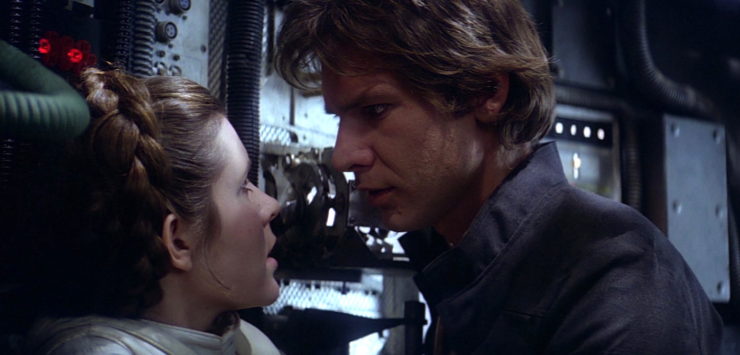It’s the classic romantic moment of Star Wars, arguably one of the best-known on-screen kisses of all time. Han Solo has been arguing with Princess Leia for a third of film over whether or not she’s into him, and happens to spot her as she’s doing ship repairs while they’re hiding in an asteroid. He wraps his arms around her under the guise of helping, she shoves him off. He takes her hand when she appears to have pinched it in the machinery, she tells him not to do that. He says she likes him because he’s a scoundrel, she insists that she likes nice men. He counters that he is a nice man, and before she can finish her protestation, he kisses her.
This aligns with most of what you see in romantic plot lines throughout the history of cinema, and corresponds with a tactic that many men are encouraged to use in real life on women: The Wear Her Down Method. And the problem with said method is that it not only easily slips into harassment—it also often ignores the concept of consent entirely.
[Spoilers for The Rise of Skywalker ahead.]
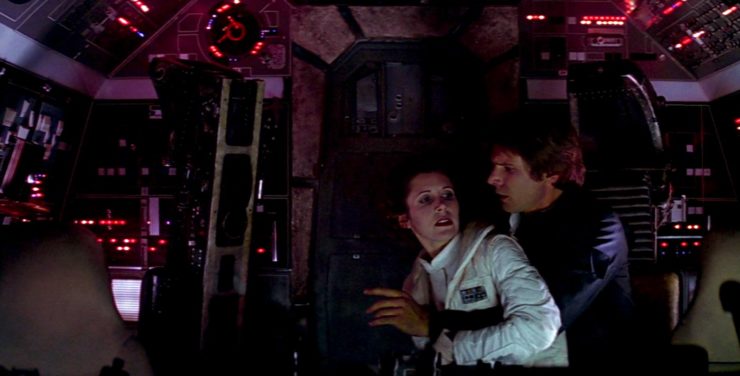
Sure, I know what you’re thinking. But it’s hot, though. And through a certain lens, yeah, I’ll give it to you. Harrison Ford and Carrie Fisher have chemistry. Leia’s protestations can often read like she objects more to what Han represents (lack of responsibility, only thinking of one’s self, caring more about money than people) than to him as a person. Part of Han and Leia’s relationship is wrapped up in Han encouraging Leia to think about the things she wants outside of her role in the Rebellion, which she clearly hasn’t had much opportunity to do. Han doesn’t go super fast here—he edges closer and closer, gauging her reaction. Leia is very into that kiss by the time it happens.
But there’s a problem with the message this sends, and a bigger problem with how Han exploits the scenario. He’s a decade older than the woman he’s trying to woo. He’s got Leia mostly alone in a situation where she’s relying on him for her life. He’s told her repeatedly that she’s into him, ignoring every protestation to the contrary. He continually makes innuendos at every interaction they have, particularly when they’re in close proximity, clearly enjoying the rise he’s getting out of her. This frustrates Leia to the point where she ends up kissing her brother (the relationship is not yet known to either of them) to try to get Han to lay off. (Leia also completely ignores consent when she kisses Luke, which is worth noting.) When you frame all of these things together, it’s really difficult not to see that kiss as the product of relentless coercion.
We see similar issues in Solo: Han misses all the important clues about Qi’ra when he finds her, years after they were separated trying to escape Corellia. He keeps pushing for their reunion to rekindle the romance he remembers from their youth, and she keeps having to sidestep those advances. Han even does the same to Lando when they meet—whether or not you consider that friendship to have romantic undertones, Han inserts himself into Lando’s life despite all evidence that Lando really would prefer Han to disappear permanently. Is Han Solo’s inability to discern or respect people’s boundaries a part of why he and Leia ultimately don’t work out? There are plenty of other important factors, the primary one being their son’s turn to the dark side, but their discussions in The Force Awakens indicate that it was never their only problem.
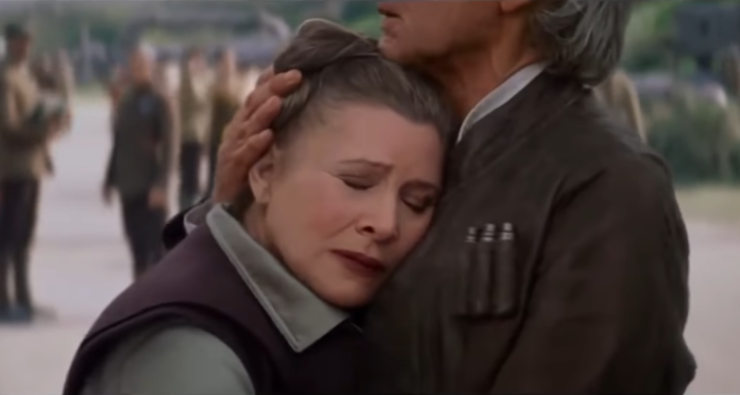
Consent is a messy and upsetting issue in the Star Wars universe. In a place where droids and living beings can be bought and sold as slaves, and children can be conscripted into First Order ranks or Jedi Order training without choice, it’s obviously not a topic that enters anyone’s heads too often. But that doesn’t mean it shouldn’t, or that these problems can’t be handled differently going forward. The Rise of Skywalker actually confronts the need for consent and the idea of personal boundaries more than once, and in a number of ways. While this particular theme is subtle, it builds throughout the story, starting with C-3PO.
Buy the Book


Network Effect
The concept of consent is frankly negligible for droids in the Star Wars universe—we see this with the mind wipes that Threepio is forced to undergo, and with Elthree’s journey toward self-actualization and droid activism ending when she becomes a part of the Falcon’s computer in Solo. In The Rise of Skywalker, we also get a reminder of it in Threepio’s inability to verbally translate the Sith language. The protocol droid didn’t make that decision for himself, the same way he didn’t make the choice around deity impersonation in Return of the Jedi. His programming prevents him from being able to do so, full stop.
Threepio mentions that the law around not being able to translate Sith runes was passed by the Senate of the Republic, which means that at some point, Threepio was given a mandatory software upgrade (likely while he was Padmé’s assistant) that caused this problem. But he does mention that there’s a way around it—finding someone with a criminal background to essentially break into this brain and forcibly draw the information out. His companions elect that route, but once they arrive at Kijimi and get Threepio all set up with Babu Frick, they find out that the procedure will wipe the protocol droid’s mind. Knowing that they’re essentially asking him to give up his life, they do something no one has ever really done for Threepio: They ask if he’s willing. Keep in mind that they’re fairly certain R2-D2 has a backup of his memory. Moreover, this wouldn’t be the first time humans had made demands of Threepio without giving thought to what he wanted or would acquiesce to. But in this moment, they give him the choice because that is what he has always been owed and never permitted to have.
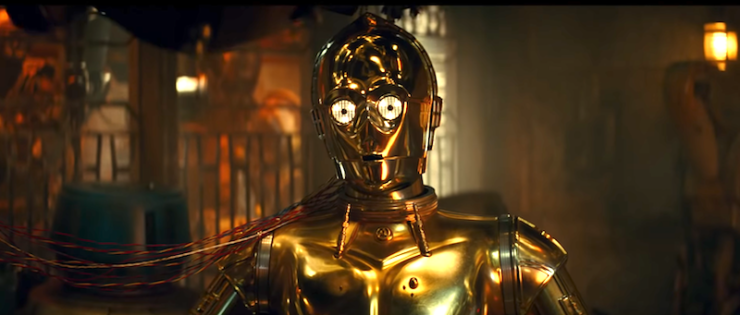
Threepio has a lot of reservations about his own sentience; when they fall through the sinking fields on Pasana and emerge below, he thinks to ask whether or not they’re in the afterlife, and whether droids are allowed there. This sentiment was actually tackled once before in the maligned Star Wars Holiday Special, where the protocol droid lamented the fact that he and Artoo were not actually “alive.” But The Rise of Skywalker treats Threepio as a living being with agency for the first time in the franchise’s history by giving him the option to say no to the demands of his humans compatriots. Lucky for them, C-3PO is braver than they give him credit for, and he agrees. And it’s worth nothing that this is the first time that Threepio has ever referred to his human “masters” and “mistreses” as friends.
Another place where consent comes to the fore is in the introduction of D-O, a sweet little droid that the group encounter on Ochi’s ship the Bestoon Legacy. BB-8 reactivates the droid, and guides him over to Rey for an introduction. But when Rey reaches out to him, D-O backs away, saying “No thank you.”
D-O’s manner and method of interaction seem very specifically targeted in their execution. In many ways, D-O serves as a useful guide for children in establishing their own boundaries and bodily autonomy. No thank you is a phrase that many parents teach their kids in order to help them make clear when they’re uncomfortable, and Rey recognizes this reaction instantly—she doesn’t demand to touch D-O, and notes to BB-8 that he has clearly been poorly treated in the past. Instead, she comforts him verbally, eventually earning his trust enough to help repair his squeaky wheel. D-O uses no thank you to make his displeasure known on more than one occasion, but he’s also learning about boundaries for himself. He goes through Rey’s things when she’s absent, and Finn tells him not to touch her stuff. This gives the droid the opening to ask questions of Finn, wondering where Rey has gone, and finally admitting that he misses her. Making a mistake around assumed consent gives D-O an opportunity to share his feelings with someone else.
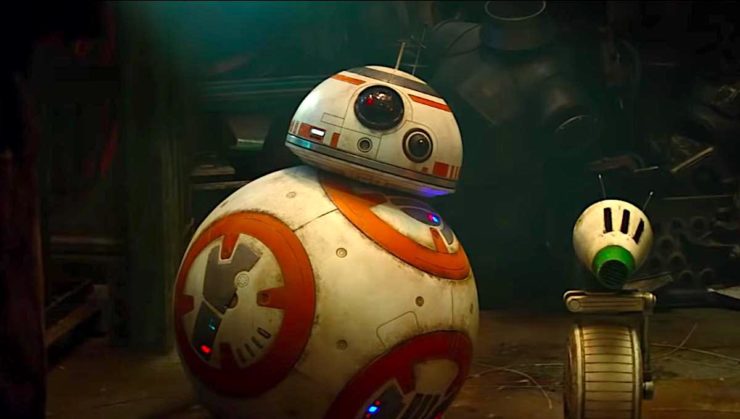
But perhaps the most important way that The Rise of Skywalker navigates consent is through the relationships between the humans on screen, and this starts with an interesting reframing of the rogue archetype in Poe Dameron. From our introduction to him, we can plainly see the Poe is a person who appreciates physical contact; he regularly clasps people by the shoulders, prefers to talk standing close, has an endless amount of hugs to pass around to the people (and droids) he cares about. On a reunion with Zorii Bliss, a former flame and member of the spice-running crew he was a part of years ago, Poe begins flirting all over again and it seems like the film is setting us up for a Han-Leia style dynamic.
But when Zorii helps Poe and his friends by giving up a First Order Captain’s Medallion so that they can infiltrate a star destroyer and save Chewie, this goes over differently than what we’ve previously seen. Rather than make innuendos or take her in his arms, Poe says “Can I kiss you?” And Zorii insists that he gets out of there. He asks, is rebuffed, and keeps moving. And the thing about Poe asking is… it’s incredibly hot. Frankly, the query is hotter than seeing a kiss would be. In that moment, the film performs a complete reversal of Han and Leia’s kiss on the Falcon and posits a different way of engaging with desire entirely.
Of course, some people would say “He only asked because she’s wearing that giant helmet!” But their last interaction of the film proves otherwise: When they see each other on Ajan Kloss after the final battle, the two give each other a nod of acknowledgement. Then Poe glances off to the side, asking without words if Zorii would like to go somewhere a little more private. She shakes her head. He takes that in stride and moves along without further appeal—if she’s not interested, then neither is he. Seconds later we see him wrapping a hand around the back of Finn’s neck in a tender hug. Because Poe Dameron may be a flirt, may be an incredibly tactile and physically affectionate person, but that desire has to be mutual and reciprocated for him to pursue it.
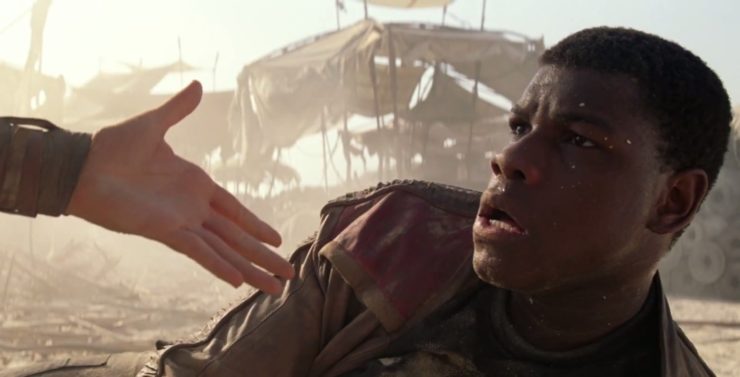
Finn has his own journey in that regard. While Poe may be ready to embrace anywhere, any time, Finn’s meet cute with Rey is laced with irritation on her end because he won’t stop taking her hand. He and Rey get more comfortable with one another by the end of The Force Awakens, but even after that bond has solidified, Finn is still checking in with Rey, offering his hand rather than taking hers once they’ve decided on their next course of action. When Poe asks if they all need to take each other’s hands now, before heading off to Kijimi, Finn insists. Poe’s not really feeling the vibe, but he acquiesces in that moment because he knows he’s being grumpy, and these are his friends. (Threepio taking his hand is a step too far, however.)
The film goes so far as to build this issue into Ben Solo’s arc—after all, the dark side has no care for people’s boundaries whatsoever. Snoke poked and prodded at Kylo and Rey’s minds earlier in the trilogy, shoving them at each other and promoting their bond. By the time we hit Rise of Skywalker, Ren has adopted Snoke’s tactics for his own, using that connection to his own advantage to try and find Rey. He tells her that once he does, he’s going to turn her to the dark side, and forces her to confront the truth about her parents despite Rey pointedly telling him to stop and saying the words “I don’t want this.” After all, refusing to acknowledge consent is about asserting power over someone, which is precisely what the Sith are about.
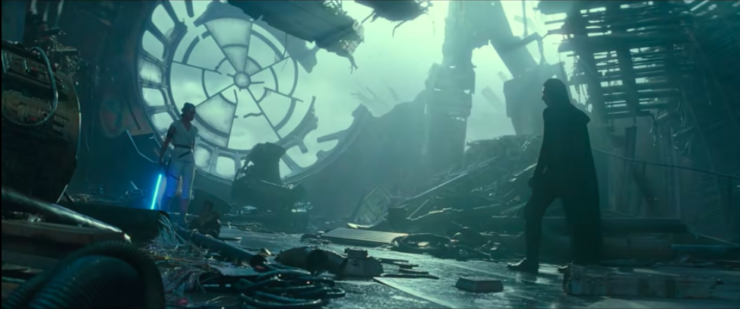
Once Kylo breaks with the dark side and effectively becomes Ben Solo again, his relationship to Rey shifts on a fundamental level; rather than invading her personal space and refusing her boundaries, Ben makes his new purpose aiding in her journey, offering himself up as assistance in her fight. After spending an entire film trilogy asserting that Anakin Skywalker’s lightsaber was his birthright and trying to take it from Rey, he is only given the chance to wield it once she has deemed him worthy of it. He is so intent on correcting for past deeds that making amends leads to his own death, returning the life she passed to him. And while there is no verbal communication about the kiss they share, it is clearly desired by both parties, as they just kinda crash into each other. The fact that these are Ben Solo’s final acts are not simply a connect-the-dots exercise in plot—they assert the idea that atonement only comes from asking the injured party what they require of you and respecting their response.
When you compare all of this to how consent was previously handled in Star Wars films, The Rise of Skywalker has a notable point of view on the subject, one that is far healthier and kinder than what came before. Whether this was an intentional readjustment or a happy accident makes no difference—roadmaps are roadmaps, and the ones that teach us how to be better to one another are always important.
Emmet Asher-Perrin needs everyone to acknowledge that C-3PO is brave, okay? You can bug him on Twitter, and read more of her work here and elsewhere.










